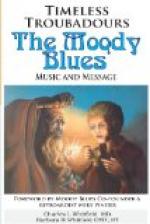Dante perhaps exaggerated the part he played in stirring up strife between Henry II. and his sons; modern writers go to the other extreme. Bertran is especially famous for his political sirventes and for the martial note which rings through much of his poetry. He loved war both for itself and for the profits which it brought: “The powerful are more generous and open-handed when they have war than when they have peace.” The troubadour’s two planhs upon the “young king’s” death are inspired by real feeling, and the story of his reconciliation with Henry after the capture of his castle can hardly have been known to Dante, who would surely have modified his judgment upon the troubadour if he had remembered that scene as related by the biography. Sir Bertran was summoned with all his people to King Henry’s tent, who received him very harshly and said, “Bertran, you declared that you never needed more than half your senses; it seems that to-day you will want the whole of them.” “Sire”, said Bertran, “it is true that I said so and I said nothing but the truth.” The king replied, “Then you seem to me to have lost your senses entirely”. “I have indeed lost them”, said Bertran. “And how?” [64] asked the king. “Sire, on the day that the noble king, your son, died, I lost sense, knowledge and understanding.” When the king heard Bertran speak of his son with tears, he was deeply moved and overcome with grief. On recovering himself he cried, weeping, “Ah, Bertran, rightly did you lose your senses for my son, for there was no one in the world whom he loved as you. And for love of him, not only do I give you your life, but also your castle and your goods, and I add with my love five hundred silver marks to repair the loss which you have suffered.”
The narrative is unhistorical; Henry II. was not present in person at the siege of Hautefort; but the fact is certain that he regarded Bertran as the chief sower of discord in his family.
Mention must now be made of certain troubadours who were less important than the three last mentioned, but are of interest for various reasons.
Raimbaut d’Aurenga, Count of Orange from 1150-1173, is interesting rather by reason of his relations with other troubadours than for his own achievements in the troubadours’ art. He was a follower of the precious, artificial and obscure style, and prided himself upon his skill in the combination of difficult rimes and the repetition of equivocal rimes (the same word used in different senses or grammatical forms). “Since Adam ate the apple,” he says, “there is no poet, loud as [65] he may proclaim himself, whose art is worth a turnip compared with mine.” Apart from these mountebank tricks and certain mild “conceits” (his lady’s smile, for instance, makes him happier than the smile of four hundred angels could do), the chief characteristic of his poetry is his constant complaints of slanderers who attempt to undermine his credit with his lady. But he seems to have aroused a passion in the heart of a poetess, who expressed her feelings in words which contrast strongly with Raimbaut’s vapid sentimentalities.




